Read all about it - Eternity
DOES ANCIENT HISTORY REVEAL THE BIBLE IS TRUE?
If the Bible is true then records from Ancient History should show it but if we find events in history that show the Bible is wrong we can forget about believing it.
So what does Ancient History show us about the Bible?
Archaeology is the science which excavates and analyses ancient human settlements. They find buildings, pottery, tools, weapons and other artifacts, even human remains. They often find writings way back before Abraham and before Egypt.
Archaeologists have found nothing which is against what the Bible records as history and have found a great deal of artifacts which support the Bible. Here are some of these amazing facts.
Old Testament
Ebla archives
1. Critics used to say that Moses could not have written the first five books or know any of the facts before his time because no one was able to write anything down before his time. The idea was that man evolved from primates similar to apes and could only draw a few pictures.
But in 1968 archaeologists Mathiae and Petinato uncovered the site Tell Mardikh in Ebla in Northern Syria.
 |
They found 17 000 tablets dating back 1000 years before Moses which showed laws, customs and events recorded in writing. The critics who said there was no writing and that laws were not known in 'primitive times' had to write new books. |
They also had to admit they were wrong about the cities of Sodom and Gomorrah being only legends when they read about them in the Ebla archives. If only they believed the Bible as a historical record they would not have led thousands and thousands of people to mistrust the Bible.
Abraham came from Mesopotamia
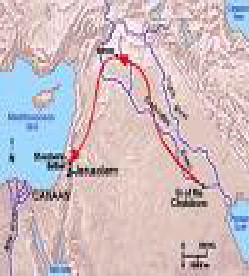 |
2. Critics did not believe Israel began in Mesopotamia as Genesis claims but archaeologists have recently found Hebrew origins dating back to the Batikh valley in NW Mesopotamia. |
Tower of Babel
| 3. Genesis 11:1 claims the whole earth was of one language and one speech before the Tower of Babel where God split them up by giving them different languages. People have called this just a legend or myth to explain different national languages and customs. | 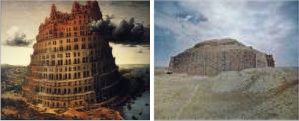 |
However modern philologists such as A. Trombetti and M. Mueller can trace languages to a common origin. Otto Jespersen even goes so far as to say that language was directly given to the first man by God. These men are scientists who are finding out the Bible is accurate and leaving the disbelieving public scratching their heads.
Walls of Jericho
4. The Bible in Joshua 6:20 says the walls of Jericho fell down flat when the people of Israel trusted God and marched around 7 times blowing horns. Critics said this was impossible but that is because they refuse to believe in God and His book the Bible.
 |
The archaeologist Garstang uncovered the walls that every tourist can see today; they fell outwards so completely that the attackers could clamber over the ruins into the city. So much for the idle spectators. |
5. Critics used to say that the name Abraham was not a name used in Babylon where he came from. But archaeologists such as Burrows have uncovered this name in their exploration of this area in Iraq.
Nuzi library ruins
| 6. Critics used to say the Bible's stories cannot be believed.
But excavations at Nuzi and Mari have uncovered huge libraries which recorded the laws of Moses in Hittite, Assyrian, Sumerian and Eshumma codes. |
 |
Brass Mirror
7. J. Wellhausen in the 19th century could not believe brass mirrors were used in the tabernacle by Moses.
 |
But he did not know there were similar brass mirrors found in ruins in Egypt from the same time period when Moses lived there. Hundred of scholars have been led astray by such foolishness. |
New Testament
Ruins in Ephesus
1. Sir William Ramsay was one of the greatest archaeologists alive. He was taught by the German historical school to believe the Book of Acts was written after AD120. But he was forced to reverse his beliefs after studying the land of Turkey.
| Any tourist can walk among the ruins of cities like Ephesus and Antioch and see it as Luke described it.
|
 |
Inside museums they can now see writings, statues, pottery etc. which came from Paul's time. Ramsay places Luke among the greatest historians ever known.
Census record - Quirinus
2. Scholars told us not to believe in Luke's description of the times when Jesus was born. They said there was no census, Quirinius was not governor of Syria and people did not have to travel to their ancestral homes.
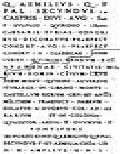 |
But recent archaeological discoveries have uncovered records of regular enrollment and censuses of all people in Roman provinces and that Quirinius was governor around 7 BC.
|
Also a papyrus found in Egypt from that time reads, "Because of the approaching census it is necessary that all those residing for any cause away from their homes should at once prepare to return to their own governments..."
Pavement inscription - Corinth
3. Archaeologists have found the name 'Erastus, curator of public buildings', on a pavement in ancient Corinth. Paul mentioned Erastus, the city treasurer of Corinth, in Romans 16:23.
| They also found an inscription "Synagogue of the Hebrews" where Paul debated and the city meat market which Paul writes about in 1 Corinthians 10:25.
|
 |
Theatre of Ephesus
 |
4. The theatre where Paul assembled with the Ephesian public to debate about the silver statue of Artemis (Diana) has been excavated and an inscription about this event has been found. |
5. Paul took a Gentile into the temple in Jerusalem (Acts 21:28) and caused a riot.
Many inscriptions have been uncovered at the present site of the temple which read, "No foreigner may enter within the barrier which surrounds the temple and enclosure!"
6. The court where Jesus was tried by Pilate has been recently uncovered. 'The Pavement' of John 19:13 was the Roman military headquarters in Jerusalem.
Pool of Bethesda
 |
7. The Pool of Bethesda where Jesus healed the paralysed man has been uncovered in the NE corner of the old city. |
Darkness at the crucifixion
8. Thallos was a pagan historian around AD 55 who mentions in his 'Histories' (volume 3) a darkness occurring at the crucifixion of Jesus.
| This supports Mark 15:33, "At the sixth hour [during Jesus' crucifixion] darkness came over the whole land until the ninth hour." | 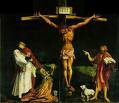 |
9. A pagan named Mara bar Serapion wrote "What advantage did the Jews gain from executing their wise king? It was just after that that their kingdom was abolished [Romans destroyed Jerusalem in AD 70]. Nor did the wise kingdom die altogether; He lived on in the teaching which he had given."
Most historians recognize the 'wise king' as Jesus.
10. Tacitus,(AD56-120) was ancient Rome's greatest historian. He wrote in 'Annals 15.44', "Christians derived their name from a man called Christ who, during the reign of Emperor Tiberius, had been executed by sentence of the procurator Pilate."
This backs up the Biblical account, but was written by a pagan.
Pliny the Younger
11. Pliny the Younger (AD 61-113) was a wealthy Roman administrator who wrote asking about how to deal with the early Church in northern Turkey, "The sum total of their guilt or error was no more than the following. They had met regularly before dawn on a determined day, and sung antiphonally [that is, alternately by two groups] a hymn to Christ as to a god. They also took an oath not for any crime, but to keep from theft, robbery and adultery, and not to break any promise." (Book 10, letter 96)
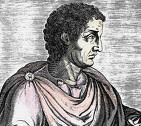 |
This letter was written to Emperor Trajan who was asked whether such people should be executed.
|
Lucian of Samosata
12. Lucian of Samosata (AD 115-200) was a well-known Greek satirist who wrote his 'The Death of Peregrinus 11-13' about the Christians in Palestine.
| "...the one whom they still worship today, the man in Palestine who was crucified because he brought this new form of initiation into the world... Moreover, that first lawgiver of theirs persuaded them that they are all brothers the moment they transgress and deny the Greek gods and begin worshipping that crucified sophist and living by his laws." | 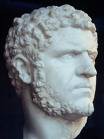 |
Josephus
13. Josephus (AD 37-100) was a Jewish historian who wrote in his 'Jewish Antiquities 18.63-64,
 |
"At this time there appeared Jesus, a wise man. For he was a doer of startling deeds, a teacher of people who received the truth with pleasure. And he gained a following both among many Jews and among many of Greek origin. And when Pilate, because of an accusation made by the leading men among us, condemned him to the cross, those who had loved him previously did not cease to do so. And up until this very day the tribe of Christians, named after him, has not died out." |
The Talmud
14. The Talmud (written AD120-200) is a Jewish document of law which reports on Jesus:
| "On the eve of Passover Jesus was hanged (on a cross). For forty days before the execution took place, a herald went forth and cried, 'He is going forth to be stoned because he has practiced sorcery and enticed and led Israel astray. Anyone who can say anything in his favour, let him come forward and plead on his behalf.' But since nothing was brought forward in his favour, he was hanged on the eve of Passover." | 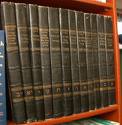 |
These are just a few of the documents written by non-Christians about Jesus and the early Church.
For more please read 'The Christ Files' by John Dickson.
Critics have no right to say Christianity is only known from New Testament writings.
There are so many more archaeological discoveries which all support the Bible but we have described enough to show you that ancient history is accurately described by the Bible.
It is utter foolishness to disbelieve the Bible.